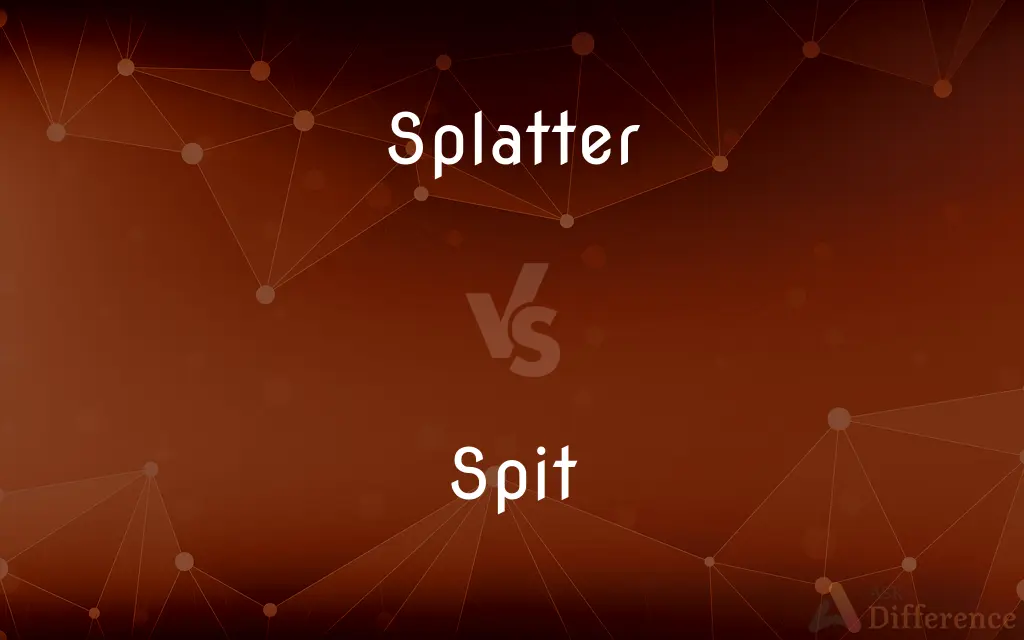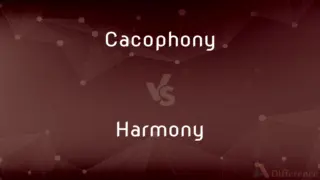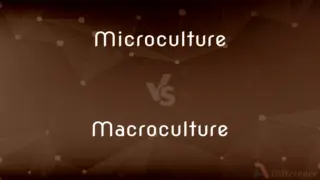Splatter vs. Spit — What's the Difference?
Edited by Tayyaba Rehman — By Maham Liaqat — Updated on March 29, 2024
Splatter involves liquid scattering in many small drops, often due to impact, while spit is the act of forcibly ejecting saliva or liquid from the mouth.

Difference Between Splatter and Spit
Table of Contents
ADVERTISEMENT
Key Differences
Splatter is associated with the scattering or spraying of liquid in many small drops, typically as a result of an object hitting a liquid surface or a liquid being thrown against a surface. This action can be unintentional or part of a process, like painting. On the other hand, spit specifically refers to the act of ejecting saliva, or sometimes another liquid, from the mouth, often with force. This is a deliberate action and can be a natural reaction or a gesture.
When liquid splatters, it spreads out in various directions, creating a pattern of small drops, which can happen during cooking, rain hitting a window, or a paintbrush striking a canvas. Whereas, when someone spits, the liquid is directed in a specific trajectory, controlled by the force and direction of the expulsion from the mouth.
Splatter is often used to describe a mess or the result of an action, highlighting the spread and impact of liquid droplets on surfaces. It emphasizes the aftermath of liquid interaction with objects. Spit, however, is focused on the act itself, involving a person's deliberate expulsion of liquid from the mouth, and is often associated with disdain or the need to remove unwanted substance.
The term "splatter" can be used in various contexts beyond the literal scattering of liquids, such as describing the effect of light through leaves or the distribution of elements in a design. Spit, while primarily referring to the act of ejecting from the mouth, can also metaphorically describe a small or insignificant amount of something, emphasizing its minimal presence.
While both actions deal with the movement of liquids, the intentions and outcomes are distinctly different. Splatter is more about the effect of liquids colliding with surfaces, whereas spit is about the intentional act of ejecting liquids from the mouth, often reflecting a human action with specific intent.
ADVERTISEMENT
Comparison Chart
Definition
Scattering of liquid in small drops.
Forcibly ejecting saliva or liquid from the mouth.
Action
Caused by impact or force against a surface.
Deliberate ejection by a person.
Result
Patterns of drops on surfaces.
Directed trajectory of liquid.
Context
Often unintentional, related to accidents or specific activities.
Intentional, can be a natural reaction or gesture.
Association
Mess, dispersion, artistic techniques.
Disdain, expulsion, hygiene.
Compare with Definitions
Splatter
The act of liquid scattering in drops.
The rain splattered against the window.
Spit
Often associated with disdain or disgust.
The character spit in contempt.
Splatter
Used to describe a messy dispersion.
Paint splattered all over the floor during the art project.
Spit
Can involve expelling any liquid or substance.
She spit watermelon seeds into the garden.
Splatter
Involves a wide spread of small droplets.
The mud splattered up the side of the car.
Spit
Controlled expulsion with specific aim.
Contestants in a spitting contest aim for distance.
Splatter
Emphasizes the pattern or mess created.
The soup splattered on the stove, needing cleanup.
Spit
Sometimes refers to a small amount.
A spit of rain was all that fell during the drought.
Splatter
Can occur in various contexts beyond liquids.
Sunlight splattered through the leaves.
Spit
Ejecting saliva from the mouth.
He spit out the bitter medicine.
Splatter
To spatter (a surface or object), especially to soil with splashes of liquid.
Spit
Saliva, especially when expectorated; spittle.
Splatter
To cause (a liquid) to fall on a surface or object.
Spit
The act of expectorating.
Splatter
To spatter, especially to fall or strike something so as to cause splashes.
Spit
Something, such as the frothy secretion of spittle bugs, that resembles spit.
Splatter
A splash of liquid.
Spit
A brief, scattered rainfall or snowfall.
Splatter
Characterized by gory violence
Splatter films.
Spit
(Informal) The perfect likeness
He's the spit and image of his father.
Splatter
An uneven shape or mess created by something dispersing on impact.
He had a hard time cleaning up the paint splatters on the carpet.
Spit
A slender, pointed rod on which meat is impaled for roasting.
Splatter
A genre of gory horror.
Splatter film; splatter movie
Spit
A narrow point of land extending into a body of water.
Splatter
Spurious emissions resulting from an abrupt change in a transmitted radio signal.
Spit
To eject from the mouth
Spat out the grape seeds.
Splatter
(intransitive) To splash; to scatter; to land or strike in an uneven, distributed mess.
The drink splattered all over me, the table, and the floor when I knocked it over.
Spit
To eject as if from the mouth
A fire spitting sparks.
Splatter
(transitive) To cause (something) to splatter.
He splattered paint onto the wall.
Spit
To emit suddenly and forcefully
Spat out an insult.
Splatter
(transitive) To spatter (something or somebody).
Spit
To eject matter from the mouth; expectorate.
Splatter
To spatter; to splash.
Spit
To express contempt or animosity, especially by ejecting matter from the mouth.
Splatter
The noise of something spattering or sputtering explosively;
He heard a spatter of gunfire
Spit
To make a hissing or sputtering noise
French fries spitting in the pan.
Splatter
A small quantity of something moist or soft;
A dab of paint
A splatter of mud
Spit
To rain or snow in light, scattered drops or flakes.
Splatter
Cause or allow (a liquid substance) to run or flow from a container;
Spill the milk
Splatter water
Spit
To impale on or as if on a spit.
Splatter
Dash a liquid upon or against;
The mother splashed the baby's face with water
Spit
A thin metal or wooden rod on which meat is skewered for cooking, often over a fire.
Spit
A generally low, narrow, pointed, usually sandy peninsula.
Spit
(uncountable) Saliva, especially when expectorated.
There was spit all over the washbasin.
Spit
(countable) An instance of spitting; specifically, a light fall of rain or snow.
Spit
A person who exactly resembles someone else (usually in set phrases; see spitting image).
Spit
(uncountable) slam
Spit
The depth to which the blade of a spade goes into the soil when it is used for digging; a layer of soil of the depth of a spade's blade.
Spit
The amount of soil that a spade holds; a spadeful.
Spit
(transitive) To impale on a spit; to pierce with a sharp object.
To spit a loin of veal
Spit
(transitive) To use a spit to cook; to attend to food that is cooking on a spit.
She’s spitting the roast in the kitchen.
Spit
(ambitransitive) To evacuate (saliva or another substance) from the mouth, etc.
Spit
(ambitransitive) To emit or expel in a manner similar to evacuating saliva from the mouth.
A hot pan spitting droplets of fat
Spit
(impersonal) To rain or snow slightly.
Spit
(ambitransitive) To utter (something) violently.
Spit
(intransitive) To make a spitting sound, like an angry cat.
Spit
To rap, to utter.
Spit
(in the form spitting) To spit facts; to tell the truth.
He's spitting for sure.
Spit
To dig (something) using a spade; also, to turn (the soil) using a plough.
Spit
To plant (something) using a spade.
Spit
To dig, to spade.
Spit
A long, slender, pointed rod, usually of iron, for holding meat while roasting.
Spit
A small point of land running into the sea, or a long, narrow shoal extending from the shore into the sea; as, a spit of sand.
Spit
The depth to which a spade goes in digging; a spade; a spadeful.
Spit
The secretion formed by the glands of the mouth; spitle; saliva; sputum.
Spit
To thrust a spit through; to fix upon a spit; hence, to thrust through or impale; as, to spit a loin of veal.
Spit
To spade; to dig.
Spit
To attend to a spit; to use a spit.
She's spitting in the kitchen.
Spit
To eject from the mouth; to throw out, as saliva or other matter, from the mouth.
Spit
To eject; to throw out; to belch.
Spit
To throw out saliva from the mouth.
Spit
To rain or snow slightly, or with sprinkles.
It had been spitting with rain.
Spit
A narrow strip of land that juts out into the sea
Spit
A clear liquid secreted into the mouth by the salivary glands and mucous glands of the mouth; moistens the mouth and starts the digestion of starches
Spit
A skewer for holding meat over a fire
Spit
The act of spitting (forcefully expelling saliva)
Spit
Expel or eject (saliva or phlegm or sputum) from the mouth;
The father of the victim spat at the alleged murderer
Spit
Utter with anger or contempt
Spit
Rain gently;
It has only sprinkled, but the roads are slick
Spit
Drive a skewer through;
Skewer the meat for the BBQ
Common Curiosities
Can spit cause a splatter?
Yes, spit can cause a splatter if it hits a surface and scatters in small drops.
What primarily differentiates splatter from spit?
Splatter is about liquid scattering in drops often due to impact, while spit involves the deliberate ejection of saliva or liquid from the mouth.
Is splatter always unintentional?
Not always; splatter can be part of intentional actions, such as in painting techniques, but it often refers to unintentional dispersion.
Why do people spit?
People spit to expel saliva, unwanted substances, or for reasons of hygiene, disdain, or cultural practices.
Is spitting considered rude?
In many cultures, spitting in public or in front of others is considered rude or disrespectful, though practices vary globally.
How can you clean up a splatter?
Cleaning up a splatter typically involves wiping the scattered droplets from the affected surface, often using cleaning agents if necessary.
How does splatter affect cleanliness?
Splatter can lead to messes that require cleaning, as it spreads liquids over surfaces, often unexpectedly.
Can splatter be prevented?
Using guards or reducing force can minimize splatter, especially in cooking or painting.
Is there a health concern with spitting?
Spitting can pose health concerns by spreading germs, especially in public places, highlighting the importance of hygiene.
What is a spit take?
A spit take is a comedic reaction where someone spits out their drink in response to something surprising or humorous.
What does "a spit of land" mean?
It refers to a narrow point of land projecting into a body of water, not related to the act of spitting but using the idea of something slender or projecting.
Do culinary terms use "splatter"?
Yes, "splatter" is often used in culinary contexts to describe oil or sauce that scatters from a pan during cooking.
Is splattering used in art?
Yes, splattering is a technique used in art to create interesting textures and patterns by flicking or throwing paint onto a surface.
Can both terms be used metaphorically?
Yes, both can have metaphorical uses, with "splatter" describing any form of dispersion and "spit" sometimes referring to a small, insignificant amount.
Can animals spit?
Certain animals, like camels or llamas, are known to spit as a defensive action or to express displeasure.
Share Your Discovery

Previous Comparison
Cacophony vs. Harmony
Next Comparison
Microculture vs. MacrocultureAuthor Spotlight
Written by
Maham LiaqatEdited by
Tayyaba RehmanTayyaba Rehman is a distinguished writer, currently serving as a primary contributor to askdifference.com. As a researcher in semantics and etymology, Tayyaba's passion for the complexity of languages and their distinctions has found a perfect home on the platform. Tayyaba delves into the intricacies of language, distinguishing between commonly confused words and phrases, thereby providing clarity for readers worldwide.
















































